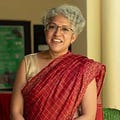Madhura Swaminathan is a Professor and Head of the Economic Analysis Unit, at the Indian Statistical Institute, Bangalore.
She has a doctorate in Economics from the University of Oxford and has worked on food security, agriculture, and rural development issues for over 25 years. She has authored ten books and numerous publications including Weakening Welfare: The Public Distribution of Food in India in 2000 and How Do Small Farmers Fare? Evidence from Village Studies in India in 2017. Her most recent, edited book is Women and Work in Rural India (2020). She was a member of the Government of India’s High-Level Panel on Long-Term Food Security, a two-term member of the board of governors of CIP (2002-8), and served on the Committee of Development Policy of the Economic and Social Council of the United Nations for the period 2013-2015. Currently, she is a Member of the Kerala Statistical Commission.
In this podcast, Professor Swaminathan discusses the fact that official statistics don't reveal the true picture of women's work in rural India. Time use data suggests women spend long hours a day on economic activity and care work, together resulting in 60 to 80-hour weeks. When women are not engaged in economic activity, it is because of a lack of suitable employment. She suggests that we need to disaggregate the peasant household and examine women's contribution to labor on and off the family farm separately. Patterns of male and female work in agriculture are distinct and also changing in different ways. Much of the data for her analyses comes from surveys conducted by the Foundation for Agrarian Studies (www.fas.org.in), an organization and network of scholars working on the theoretical and empirical characterization of rural India.
The biggest source of new employment for rural women in recent years has been as low-paid, contractual "voluntary" or "scheme" workers in the education, health, and nutrition sectors. While working for the government, these women lack all social security benefits.














Women's Declining Employment in India